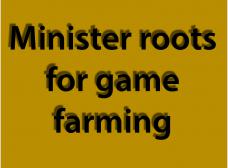Minister roots for game farming
The mere ownership of land does not automatically translate into wealth and game farms aren’t mere playgrounds for the [wealthy] that don’t contribute to SA’s economy. Perceptions like these over-simplify the sensitive land- and poverty debate in South Africa and should be changed, dr. Pieter Mulder, deputy minister of agriculture, forestry and fisheries, said at a public meeting this week.
Mulder highlighted the important role game ranching plays in SA and emphasised that Africa’s poverty problem will not be resolved by merely handing land to people.“At present there are about 10 000 game farms in SA and the majority of these are in areas where the land is not truly suitable for agriculture and where game farming is mostly the best option.” (This is especially true for many parts of Limpopo in Northern News’s distribution area.)
“Top quality agricultural land in SA is scarce and only 0,2% of the country’s surface can be seen as class one land, which is extremely suitable for agriculture. It shows the importance of game farms and -farming to fully utilise all available land in the country,” he explained.
About the redistribution of land, Dr. Mulder said more land is needed for subsistence farming as part of the political solution and poverty problems in SA and Africa. “In this regard it is important to take note that 5% of SA’s land become available every year in the open market which could, without any disruption to agriculture, be purchased.
“At the same time, the acknowledgement that nine out of every ten land transfers have failed in recent times, points to a problem in the land reform programme and it creates a serious crisis,” he said. “If the process of land transfers suddenly leaves too much productive land unused due to these failures, food security is compromised. In future the balance between political land claims and economic realities will have to be watched carefully,” he warned.













0 Comments